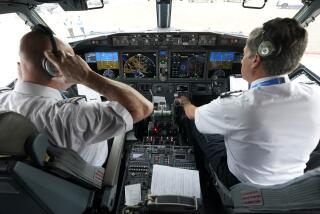Germanwings copilot had health, psychological problems, reports say
- Share via
Reporting from Paris — Additional evidence emerged Saturday to suggest copilot Andreas Lubitz had health issues that should have prevented him from being allowed anywhere near the controls of the Germanwings A320 Airbus that he apparently deliberately flew into a mountain in the southern Alps on Tuesday, killing all 150 people aboard.
As well as medical findings, one of the copilot’s former girlfriends came forward to tell a German newspaper that Lubitz, 27, told her, while they were dating last year, that he planned a spectacular gesture to make sure everyone would “remember” him. She described Lubitz as a “tormented” person who knew how to hide secrets.
The German newspaper Bild spoke to the young woman, identified only as Maria W, 26, and said she dated Lubitz for five months in 2014 during which time he said: “One day I will do something that will change the whole system and then everyone will know my name and remember it.
“I never knew what he meant, but now it makes sense,” the woman was quoted as saying.
She revealed that the pilot had suffered nightmares and that their relationship ended because his behavior scared her.
“At night, he would wake up and scream: ‘We’re going down!’”
She said if Lubitz did indeed deliberately bring down the plane, “it is because he understood that because of his health problems, his big dream of a job at Lufthansa as captain and as a long-haul pilot was practically impossible.”
German papers Saturday also reported that police officers had found medication used to treat psychiatric conditions during a search of the copilot’s home. There were also suggestions Lubitz had consulted doctors for vision problems that could have dashed his dreams of continuing to fly and be promoted to captain so he could fly long-haul routes.
It was not clear how serious his eye problem was, or whether it was psychosomatic, a source close to the inquiry told the New York Times.
German investigators found torn-up sick notes in Lubitz’s apartment in Duesseldorf including one that signed him off work on the day of the crash. German prosecutors believe Lubitz hid an existing and ongoing illness from his airline and said he had been receiving “appropriate medical treatment,” but refused to detail what the illness was, citing medical secrecy laws.
Germanwings, whose parent company Lufthansa could face a minimum $29-million compensation bill, said it had not received any sick note from Lubitz. Last week, the company said Lubitz had passed all technical, physical and psychological tests and was “100% fit to fly.”
Flight 9525 was almost halfway through its route from Barcelona to Duesseldorf when it began an inexplicable, rapid but controlled descent. The recording from the’ black box’ cockpit voice recorder suggested Lubitz had locked captain Patrick Sonderheimer out of the flight deck after the commander left to use the lavatory, and refused to let him back in. Lubitz apparently deliberately set the plane on a crash course into the mountains in the southern Alps. The aircraft was traveling at 435 mph when it struck and exploded, killing all 150 people aboard -- 144 passengers and six crew -- instantly.
French investigator Jean-Pierre Michel told AFP news agency Saturday that Lubitz’s personality was a “serious lead..but cannot be the only one.”
“We’re going to try to understand what in his life could have led him to carry out the act,” Michel said, adding that investigators had not yet discovered a “particular element.”
Because the crash took place in France, French police and judicial authorities are carrying out the investigation. Three French officers have traveled to Duesseldorf to retrieve elements of the German investigation.
A Mass was said for the victims at Digne-les-Bains in the French Alps near the site of the plane crash. Around 200 people, including family members and friends of the victims attended the service.
Germanwings issued a statement Saturday saying the families of the victims wished to be left alone by the media for the time being. It added they would speak later “when calmer and more tranquil.” The company also published a condolence notice on its website.
“The terrible loss of 150 human lives had deeply saddened us. We present our sincere condolences to all those family and friends of passengers and our colleagues. Our thoughts and our prayers are with them. We would like to thank the thousands of emergency workers and volunteers in France, Spain, Germany and numerous other countries for their help and assistance.”
It was signed in the name of all Lufthansa group employees by company president Carsten Spohr, and Germanwings spokesperson Thomas Winkelmann.
Willsher is a special correspondent.
More to Read
Sign up for Essential California
The most important California stories and recommendations in your inbox every morning.
You may occasionally receive promotional content from the Los Angeles Times.









